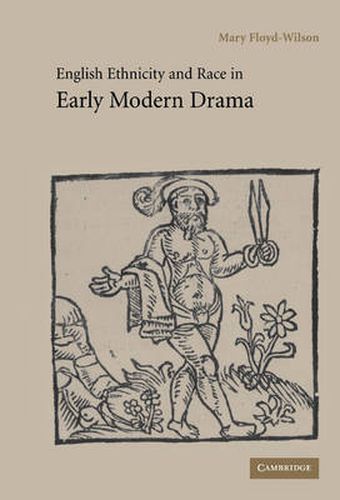Readings Newsletter
Become a Readings Member to make your shopping experience even easier.
Sign in or sign up for free!
You’re not far away from qualifying for FREE standard shipping within Australia
You’ve qualified for FREE standard shipping within Australia
The cart is loading…






In English Ethnicity and Race in Early Modern Drama, Mary Floyd-Wilson outlines what we might call ‘scientific’ conceptions of racial and ethnic differences in sixteenth and seventeenth-century English writing. Drawing on classical and contemporary medical texts, histories, and cosmographies, Floyd-Wilson demonstrates that Renaissance understandings of racial and ethnic identities contradicted many modern stereotypes concerning difference. Southerners, Africans, in particular, were identified as dispassionate, cool-tempered, and wise, whereas the more northern English were understood to be unruly, impressionable, and slow-witted. Concerned with the unflattering and constraining implications of this classically-derived knowledge, English writers labored to reinvent ethnology to their own advantage - a labor that paved the way for the invention of more familiar racial ideas. Floyd-Wilson highlights these English revisionary efforts in her surprising and transformational readings of the period’s drama, including Marlowe’s Tamburlaine, Jonson’s The Masque of Blackness, and Shakespeare’s Othello and Cymbeline.
$9.00 standard shipping within Australia
FREE standard shipping within Australia for orders over $100.00
Express & International shipping calculated at checkout
In English Ethnicity and Race in Early Modern Drama, Mary Floyd-Wilson outlines what we might call ‘scientific’ conceptions of racial and ethnic differences in sixteenth and seventeenth-century English writing. Drawing on classical and contemporary medical texts, histories, and cosmographies, Floyd-Wilson demonstrates that Renaissance understandings of racial and ethnic identities contradicted many modern stereotypes concerning difference. Southerners, Africans, in particular, were identified as dispassionate, cool-tempered, and wise, whereas the more northern English were understood to be unruly, impressionable, and slow-witted. Concerned with the unflattering and constraining implications of this classically-derived knowledge, English writers labored to reinvent ethnology to their own advantage - a labor that paved the way for the invention of more familiar racial ideas. Floyd-Wilson highlights these English revisionary efforts in her surprising and transformational readings of the period’s drama, including Marlowe’s Tamburlaine, Jonson’s The Masque of Blackness, and Shakespeare’s Othello and Cymbeline.